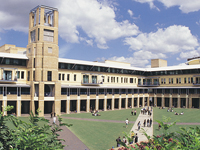| Economics (Liberal Studies) - 3553 |
|
||||||||||||||||||||||||||||||||||

Program Summary
The Bachelor of Economics (Liberal Studies) is a 4 year undergraduate program, incorporating a comprehensive and rigorous program in commerce and economics, and liberal studies in the context of global business. The program requires study in the broad areas in Arts and Sciences and in critical analysis.
Program Objectives and Learning Outcomes The program is designed to give students the flexibility to choose broader areas of study depending on their interests and aspirations, therefore providing a broad liberal education while obtaining a professional business qualification.
The program leading to the award of the Bachelor of Economics (Liberal Studies) consists of 192 units of credit (32 courses) to be completed over a period of four academic years. These units will be made up of:
First Year Core Courses
PLUS
OR
AND
*A minimum of 12 units of credit must be completed in each of the two chosen areas
Business
*Can be taken as a co-major or minor only
Liberal Studies Areas of Study
Humanities
Social Science
* For a major, courses must be taken from the Faculty of Arts
Language
Science
*These areas of study can be taken as a minor only
For the Honours degree, a student must complete a further 48 UOC in an approved disciplinary stream
i. Honours may be taken in the Business stream only ii. Honours may be taken in one disciplinary stream only iii. The additional units, comprising of specified courses from the relevant disciplinary stream and a thesis, must be completed in two sessions following the completion of the Pass degree component iv. Honours degree will not be awarded if academic performance is below the prescribed level v. Except when recommended to the contrary by the relevant Head of School, a student intending to enter the Honours year must a. satisfy the Pass degree requirements, and obtain a minimum average of 70% in Level 2 and Level 3 courses of the relevant disciplinary stream in the Pass degree component b. pass all courses in the Pass degree component at first attempt vi. Except with the special permission of the course authority on the recommendation of the relevant Heads of School, a person on whom the Pass degree of Bachelor of Economics (Liberal Studies) or equivalent has been conferred shall not be admitted to candidature for the Honours degree of Bachelor of Economics (Liberal Studies). A student cannot:
i. count more than 84 UOC of Level 1 core and electives courses towards their degree unless in exceptional circumstances ii. have more than three majors recognised by the Faculty in this degree program iii. achieve superior academic performance throughout the program and be conferred the Pass degree with Distinction. For information regarding fees for UNSW programs, please refer to the following website: https://my.unsw.edu.au/student/fees/FeesMainPage.html
Further information regarding this program is available at the Faculty of Business.
Related Program(s) |
|||||||||||||||||||||||||||||||||||

| Contacts | Library | myUNSW | WebCT |